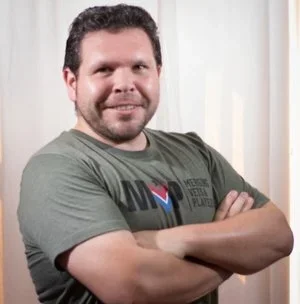Bobby Wise
I Wish I Had This Program When I Left
Bobby grew up in Chicago, Illinois. He was an only child; his parents were married for 46 years before his father’s death in January 2018. He helped out in the family construction business before joining the US Army at 18 in 2000. He served as a Blackhawk mechanic and crew chief out of Fort Campbell, Kentucky and deployed twice to Iraq in support of Operation Iraqi Freedom.
“After my contract was up, I went back home to Chicago in 2006 and spent one year in the Illinois National Guard to serve out my inactive commitment.”
He started classes at the University of Illinois at Chicagoin September 2006 and started volunteering on local and national political campaigns. “I started outin the fall of 2006 knocking on doors and encouraging Chicagoland families to participate in the political process. By the summer of 2008,I was a state operations director for a presidential campaign. As I traveled to other states I learned a lot about how politics works, what democracy means to people in these different places and what veterans and military families go through in other parts of the country—I got exposed to a lot of new ideas and experiences.”
Two of his favorite campaign events happened in 2008. In North Carolina, he gathered a diverse group of military spouses from Fort Bragg to discuss military family issues with the candidate's spouse. A few weeks later he gathered West Virginia vets at a pool hall where the candidate shot pool and talked about the challenges veterans face when coming home.
He graduated from the University of Illinois at Chicago, in 2013 with a BA in Social Science. After graduation, he went to work in the Schaumburgdistrict office of then-Congresswoman Tammy Duckworth, a fellow Army aviation veteran. “Around that time I was diagnosed with narcolepsy, a sleep disorder where my sleep cycles are uncoordinated, and I could be awake and would start dreaming. I sometimes have intrusive thoughts that are actuallynightmares in the middle of the day. I’ve tried medications where the side effects are worse than the symptoms. Because this job required a lot of driving I had to quit. I haven’t driven a car in five years, and I’m lucky that Chicago has a great public transportation system.”
“I came back from my military service with mild PTSD. The month of November is especially hard for me with an emotional weight tied to it. In 2003 one aircraft from my brigade was shot down, and then two aircraft were in a mid-air collision—one of them was from my platoon. My squad leader was onboard, and one of the NCOs from the maintenance company, whom I considered a mentor, was also onboard and died. I had lost about a dozen comrades in eight days.”
“The next deployment at the end of November my friend committed suicide sitting next to his parked aircraft. When we found his note and his reasons for what he did, it was heartbreaking because it all seemed like something we could have helped resolve. Every one of us in the battalion would've gladly done anything to help.”
Bobby then went to work for the National Able Network for two and a half years in the Veterans Forward program, a workforce development agency that offered job skills, professional certificate programs, and computer literacy. When NAN couldn't renew his contract, he would have to become his own career coach.
He worked as a freelance photographer for a year and a half and then helped a friend rehab a house built before the Great Chicago Fire. “I was looking for opportunities to build narratives and help others express themselves, but ultimately I spent way too much time talking to my cat. I went back to Veterans Forward, this time as a client, looking for some career counseling. I heard about MVP 48 hours later while looking at the Victor—Life After Service mobile phone app; it’s a clearinghouse for veteran services. When I started scrolling down through the list of services, I saw that MVP was going to have their grand opening in Chicago soon. I went to the POW! Gym and signed up as a participant and heard good things about the organization. I saw that they were looking for a program coordinator for the new local chapter and I applied and got the job.”
“A lot of people don’t like to talk about their military service for a variety of reasons—possibly because of survivor guilt, showing signs of weakness or feeling guilty for never firing their gun. Emotional trauma doesn’t go away until you process it and you can’t process it until you talk about it, and if you don’t talk about it, it’ll just fester.”
“That’s what MVP is all about—no one can process emotional stress on their own. They have to do it together as a team. The military trains you how to be a soldier for two months but only spends five days on how to return to civilian life. I wish I had a program like MVP when I left the military.”

